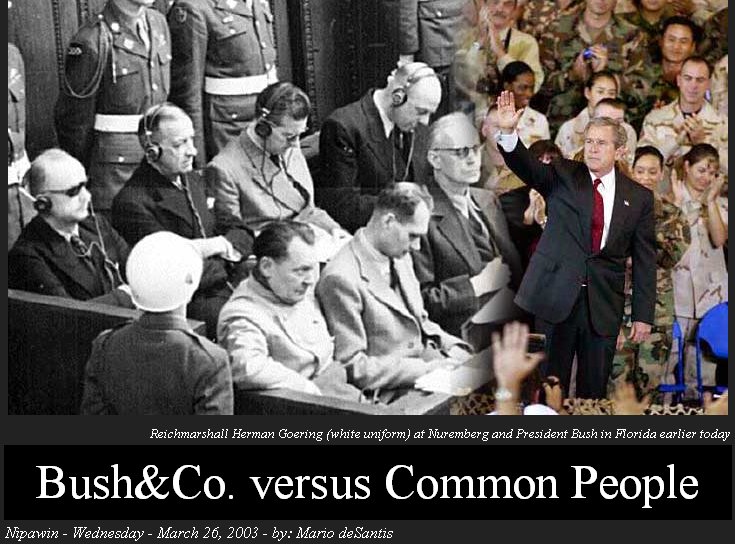Learning Stories
by
Mario deSantis
mariodesantis@hotmail.com
“I am a Canadian, free to speak without fear, free to worship in my own way, free to stand for what I think right, free to oppose what I believe wrong, and free to choose those who shall govern my country.” - -The Rt. Hon. John Diefenbaker, Canadian Bill of Rights, 1960
“The whole judicial system is at issue, it's worth more than one person.”--Serge Kujawa, Saskatchewan Crown Prosecutor, 1991
“The system is not more worth than one person's rights.”--Mario deSantis, 2002
Ensign Stories © Mario deSantis and Ensign
|
|
I began to write sharp and short political and economic articles on these pages of Ensign some five years ago, and such articles have been complemented with artistic pictures imagined by Timothy Shire, Editor of Ensign. This writing was triggered as I experienced first the corporative and narrow minded 'stick and carrot' management philosophy of Saskatchewan health, and later as I experienced the unjust understanding of Saskatchewan justice. Such despicable experiences have a very private perspective, but whenever we realize that the current world wide economic and political problems have their roots into our own private experiences then it is no wonder that our despicable private experiences can collectively have a public interest. We live in a world of hypocrisy as commanded by hypocritical elitist leaders. I had no preconceived notion that I would have used the term 'common' as often as I am presently doing. This term 'common' is becoming the critical focus for understanding our social and economic predicament. I got disgusted by the private (individual contract) justice system and of the related rule of law and I focused my attention on the understanding of Common Law. I got disgusted with the flawed economic theory of "supply and demand" as played by the theoretical market composed by rational agencies and I focused my attention on the Common Good, that is of everything which makes our collective lives more intelligent. I got disgusted by the crony capitalism as peddled by the strategic plans of rational leaders to cut costs and I focused my attention on Common Sense. I got disgusted by the bundling (fascism) of corporative and political interests and we focused our attention on the understanding of reality as either fictionally commanded by corporative interests or really chosen by our Common Interests. We live in difficult times and we are beginning to realize that we have only two super powers today, Bush&Co. and the common people of the world. Therefore, I want to stress the importance of democracy as an expression of the common people rather than as an expression of Bush&Co. As a consequence, I want people to reflect on the social significance of this extract of an interview between U.S. Army intelligence officer Gustave Gilbert and Nazi leader Hermann Goering which occurred during the Easter recess of the Nuremberg trials, 1946 April 18: Goering: "Why, of course, the people don't want war. Why would some poor slob on a farm want to risk his life in a war when the best that he can get out of it is to come back to his farm in one piece. Naturally, the common people don't want war; neither in Russia, nor in England, nor in American, nor for that matter in Germany. That is understood. But, after all, it is the leaders of the country who determine the policy and it is always a simple matter to drag the people along, whether it is a democracy, or a fascist dictatorship, or a parliament, or a communist dictatorship." Gilbert: "There is one difference. In a democracy the people have some say in the matter through their elected representatives, and in the United States only Congress can declare wars." Goering: "Voice or no voice, the people can always be brought to the bidding of the leaders. That is easy. All you have to do is tell them they are being attacked, and denounce the pacifists for lack of patriotism and exposing the country to danger. It works the same in any country." References Gilbert, Gustave M. Nuremberg Diary, p. 278,1947, Farrar, Straus & Co. Questionable Quotes, confirms the origins of Goering's comments to Gilbert http://www.snopes.com/quotes/goering.htm |
